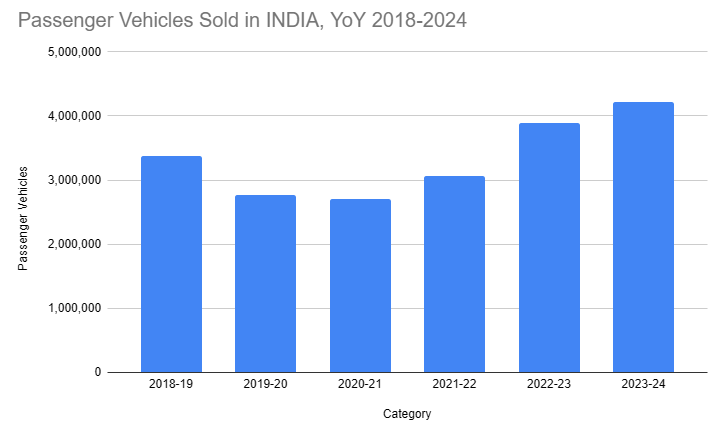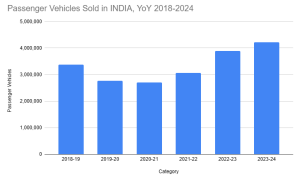The automobile industry in India is experiencing a surge in sales, especially in the passenger vehicle segment. According to the Society of Indian Automobile Manufacturers (SIAM), sales of four-wheel passenger vehicles have crossed 4 million units, reflecting the industry’s rapid growth and the increasing consumer demand for cars. While this is positive for manufacturers, auto dealers—who act as the key touch-points between consumers and brands—face stiff competition.
In cities like Chennai, Bangalore, Hyderabad, and Mumbai, there are over 20 top automobile dealers such as FPL, Harsha, Gurudev, Kun, and more, selling major brands like MG, Kia, Tata, Toyota, Honda, Hyundai among others. With so many players vying for the same pool of consumers, standing out from the crowd has become increasingly difficult. To add to the challenge, Millennials and Gen Z, the primary buyers today, prefer booking test drives and exploring cars online, without ever stepping foot into a dealership.
So how do auto dealers overcome these challenges and generate more leads? One powerful solution lies in the automation of marketing processes and leveraging data-driven tools to target the right audience at the right time. In this article, we will explore key tools for automating the marketing process, and present a case study showcasing how these tools can help auto dealers generate leads and close more sales.
1. Why Marketing Automation is Essential for Auto Dealers
Marketing automation refers to the use of technology and software platforms to automate repetitive marketing tasks and workflows such as email campaigns, social media posting, ad targeting, and lead nurturing. In the auto industry, where consumer touchpoints are numerous and customer journeys can be complex, automation enables dealers to engage with potential buyers consistently and at scale, without overwhelming their marketing teams.
Here are a few key reasons why marketing automation is essential for auto dealers:
- Efficient Lead Management: Automation helps manage leads more effectively by automatically collecting, organizing, and segmenting potential buyers based on their interests and behaviors.
- Consistent Communication: Automated email and social media campaigns ensure that prospects are regularly engaged with tailored content that resonates with their stage in the buying process.
- Targeted Advertising: Tools like Google Ads and Meta Ads (Facebook and Instagram) enable dealers to target specific demographics, including Millennials and Gen Z, who prefer digital engagement over traditional showroom visits.
- Data-Driven Decision Making: By automating data collection and analysis, dealers can access insights into consumer behavior, helping them make informed decisions about their marketing strategies.
2. Tools for Automating the Marketing Process in the Auto Industry
Here are some key tools that can help automate the marketing process for auto dealers:
a. Meta (Facebook and Instagram) Lead Generation Forms
Meta’s lead generation ads are a powerful way for auto dealers to capture leads directly on Facebook and Instagram. These forms allow potential customers to submit their contact information without leaving the platform, making it easy and convenient for them to inquire about test drives, vehicle availability, or financing options. Dealers can automate follow-up emails or SMS to engage with leads immediately after they submit their details.
How it helps auto dealers:
- Targeted Campaigns: Dealers can target users based on age, location, interests, and behavior, ensuring that their ads are shown to users who are most likely to purchase a car.
- Instant Lead Capture: Leads are captured instantly and integrated into the dealer’s CRM or email marketing platform, enabling quick follow-up.
b. Google Search Ads
Google Search Ads allow dealers to appear at the top of search results when users search for specific car models, dealerships, or financing options. Dealers can automate their search ad campaigns based on keywords related to their inventory, offering test drive bookings, or promotions on specific models.
How it helps auto dealers:
- High Intent Targeting: Users searching for specific car models or dealerships are already in the consideration phase of the buyer’s journey, making them high-intent leads.
- Ad Customization: Google Ads offers customization options such as call extensions, location targeting, and pricing highlights to make ads more relevant to the audience.
c. Email Marketing Automation Tools (e.g., HubSpot, Mailchimp)
Email marketing automation tools like HubSpot and Mailchimp allow dealers to nurture leads through personalized email campaigns. Once a lead submits their information via Meta or Google, they can automatically receive a series of emails offering more information about the cars they’re interested in, upcoming dealership events, or special promotions.
How it helps auto dealers:
- Automated Drip Campaigns: Leads can be nurtured over time with a series of emails, gradually moving them from interest to decision-making.
- Behavioral Triggers: Emails can be triggered based on specific actions, such as opening an email, clicking on a link, or booking a test drive, ensuring timely communication with potential buyers.
d. CRM Systems (e.g., Salesforce, Zoho CRM)
A Customer Relationship Management (CRM) system is crucial for tracking and managing leads from the moment they interact with a dealership’s website or ad to the time they become customers. Automation within CRMs can send notifications to sales teams when leads are ready to be contacted, ensuring no potential sale slips through the cracks.
How it helps auto dealers:
- Lead Tracking: CRMs automatically track where each lead is in the buying process, helping dealers prioritize leads who are closer to making a purchase.
- Integration with Marketing Tools: CRMs often integrate with email, social media, and advertising platforms, allowing for seamless follow-up and lead management.
3. Case Study: Automating Lead Generation for an Automobile Dealer
Background:
A leading automobile dealer in Chennai, selling brands like Kia, Hyundai, and Tata, was facing increasing competition from other dealers in the region. While the dealership had a solid online presence, its traditional marketing methods weren’t generating enough leads. They were losing out to competitors who were faster at capturing and nurturing leads through digital channels.
Challenge: The dealer wanted to increase test drive bookings and inquiries while also engaging Millennials and Gen Z consumers, who were more likely to interact with dealerships online rather than visit in person. The dealership needed a way to automate its lead generation process, reduce the manual effort of following up with leads, and improve lead-to-sale conversion rates.
Solution:
The dealership partnered with a marketing automation agency to implement the following tools:
- Meta Lead Generation Forms: The dealer ran targeted ads on Facebook and Instagram, highlighting test drive options, special discounts, and financing plans. They focused on younger demographics in Chennai who were more likely to engage with the ads digitally. The lead generation forms captured contact information from interested users, which was automatically integrated into their CRM.
- Google Search Ads: The dealership ran search ads targeting high-intent keywords like “Hyundai test drive Chennai,” “Kia Seltos price,” and “best Tata dealer near me.” The ads were optimized to appear at the top of search results, ensuring high visibility among users actively searching for cars.
- Email Automation with HubSpot: Once leads were captured, they automatically received a series of personalized emails, offering more information about the specific car models they had expressed interest in, financing options, and dealership events. Leads were segmented based on their behavior, allowing for targeted follow-up.
- Salesforce CRM: The dealership used Salesforce to track all leads and their interactions with emails, ads, and the dealership’s website. The CRM also provided alerts to the sales team when leads showed interest, enabling faster follow-up.
Results:
- 30% increase in test drive bookings: The dealership saw a 30% increase in test drive bookings within the first 60 days of implementing automated lead generation through Meta and Google Search Ads.
- Higher engagement with Millennials and Gen Z: Over 65% of the leads generated were from consumers aged 25-40, indicating that the dealership successfully targeted younger buyers who prefer digital engagement.
- Improved lead-to-sale conversion rate: By automating email follow-up and lead nurturing, the dealership’s lead-to-sale conversion rate improved by 20%, as leads were consistently engaged with timely and relevant content.
4. Proven Tips for Generating Leads in the Auto Industry
Based on the case study and industry trends, here are a few proven ways to generate leads for auto dealers:
- Use Meta and Google Search Ads to target high-intent buyers. Ensure your ads are personalized, visually appealing, and contain clear calls-to-action (CTAs) like “Book a Test Drive” or “Contact Us for More Information.”
- Leverage CRM and email marketing tools to automate follow-up with leads. Make sure leads are segmented based on their interests and behaviors to provide them with relevant content that encourages them to move forward in the buying process.
- Offer online scheduling for test drives or virtual consultations. Allowing consumers to book test drives or sales appointments online makes it easier for them to engage with your dealership, especially younger buyers who prefer digital touchpoints.
Conclusion
The rise of AI-driven automation and digital tools presents auto dealers with an unprecedented opportunity to streamline their marketing processes and reach consumers more effectively. By leveraging tools like Meta lead generation forms, Google Search Ads, email marketing automation, and CRM systems, auto dealers can capture more leads, nurture them efficiently, and ultimately increase sales.
In today’s competitive market, where Millennials and Gen Z increasingly prefer digital interactions over traditional dealership visits, marketing automation is no longer a luxury but a necessity. By embracing automation, auto dealers can stay ahead of the competition and build long-term relationships with a new generation of car buyers.






